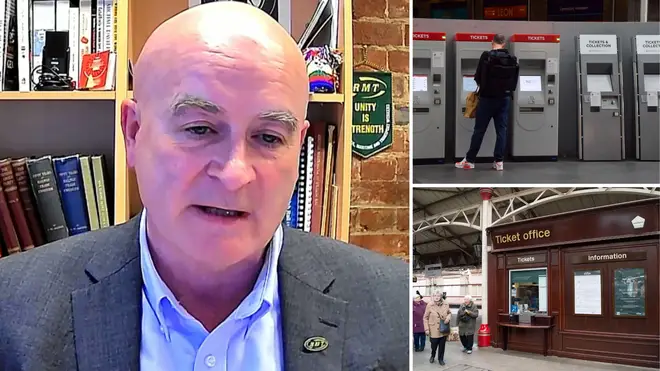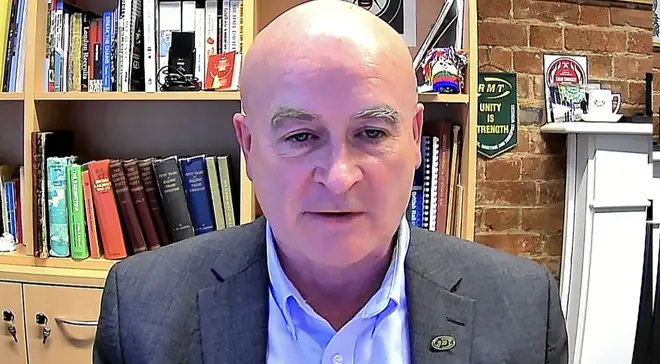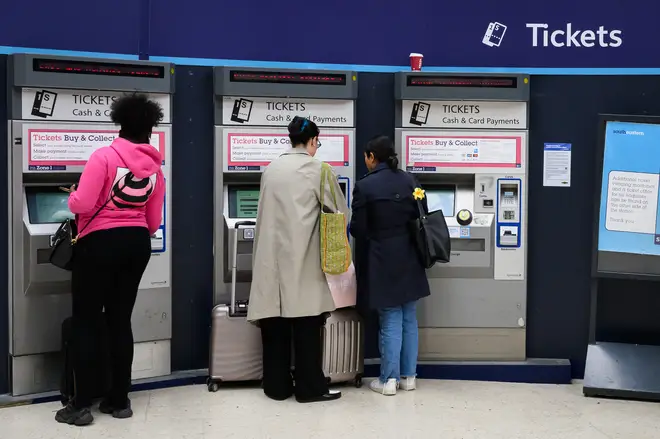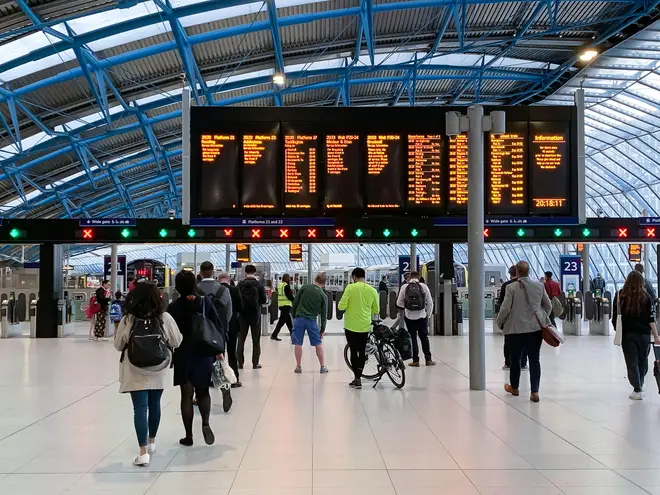
Shelagh Fogarty 1pm - 4pm
5 July 2023, 19:56 | Updated: 5 July 2023, 20:01

Plans to close ticket offices in train stations across England are an attempt to 'dehumanise' railway services and will hit vulnerable groups and staff the hardest, Mick Lynch has told LBC.
Industry body the Rail Delivery Group (RDG) officially announced its plans to close nearly every ticket office across England in the coming years in a bid to "modernise customer service".
But the announcement has been slated by many, including RMT union leader Mick Lynch who branded the move an "attack" on vulnerable groups and a "mark of what's to come" for railway services.
Speaking on LBC's Tonight With Andrew Marr, he said: "We’re going to be mobilising our members and the public and the disabled groups, women’s groups, spokespeople for the blind groups and the people that have got disabilities because this is an attack on a human railway.
"It’s what we’re seeing right across our economy, where our high streets are being stripped out of bank branches, all sorts of services are now online and many people struggle with that."
As LBC reported yesterday nearly all ticket offices could be shut with only the busiest stations left with open person-operated ticket facilities with the RDG unable to say how many jobs could be lost.
There are 1,007 stations in England run by train companies operating under contracts issued by the UK Government.

Mr Lynch also expressed concern about how he believes this is a marker of greater "dehumanisation" to come for railway services in the future.
"It’s also about security and the ticket office issue is a bit of a diversion in some ways," he continued.
"We believe in ticket offices. But once they’ve got these regulations out of the way, and the ticket office regulations are the only thing that guarantees station staff in, they will de-staff stations en masse.
"What they’ll put forward is some half-hearted commitments that 'we’ll try to get an assistant to you', but if you’re disabled, if you’re an a elderly person or somebody who's just worried about their journey, there will not be a guaranteed person there.
“In most stations that they’ve gotten away with it already they have completely de-staffed and there’s nobody on them at all.
"And if that’s the entire rail network, we’ve got a very frightening prospect in front of us. They’re now intent on making hundreds if not thousands of redundancies through this method."
For the RMT union leader, "mobilising" against such plans is important for various communities: disabled people, women's groups, the elderly and anybody who may be in need of assistance.
But Mr Lynch believes the plans are another attempt from railway companies to maximise profits.
He went on: "This is about maximising profits, these train operating companies have made profits throughout the pandemics and throughout the strikes when they subsidise.
"We predicted a year ago and two years ago that they would make this move and it’s not just for ticket office staff, they’re taking away trained dispatch staff, they’re taking customer assistant staff and the mobility people that can drive people around in little buggies.
"It’s a mark of what’s to come. They want to completely strip the railway out and make it dehumanised.”
Posters are being displayed at the vast majority of stations informing passengers about the potential closure of the ticket office.
It is not known how quickly the first sites will close, but the programme is expected to last for three years.
Read more: Boris Becker 'hid horses in his bedroom' to hide them from debt collectors, wife claims

It comes amid reports the rail industry is under pressure from the Government to save money amid the drop in revenue caused by the coronavirus pandemic.
Train companies across England will launch passenger consultations on the ticket office closures.
The RDG said 12% of train tickets are bought from offices at stations, down from 82% in 1995.
Passengers will be asked to pay for journeys by tapping contactless cards on barriers, using self-service machines, or buying tickets from staff on station concourses or trains if possible.
Transport Salaried Staffs Association interim general secretary Peter Pendle said: "We are clear the Government will face strong opposition from this union on the totally unnecessary mass closure of ticket offices.
"Ministers will soon realise that the public have no desire to see their rail network diminished in this way."

Vivienne Francis, chief social change officer at the Royal National Institute of Blind People (RNIB), said: "A mass closure of rail ticket offices would have a hugely detrimental impact on blind and partially sighted people's ability to buy tickets, arrange assistance and, critically, travel independently.
"RNIB research shows that only 3% of people with sight loss said they could use a ticket vending machine without problems and 58% said it was impossible."
Neil Middleton, director at pressure group Railfuture, urged the industry to "encourage more self-service but don't force it".
He said: "If this change drives passengers off the trains, then we'll all be worse off.
"Even though there may be a cost saving, if fewer passengers are on the trains it is very easy to see that income will reduce."
RDG chief executive Jacqueline Starr said: "The ways our customers buy tickets has changed and it's time for the railway to change with them.
"With just 12% of tickets being sold from ticket offices last year, and 99% of those transactions being available on TVMs (ticket vending machines) or online, our proposals would mean more staff on hand to give face-to-face help with a much wider range of support, from journey planning, to finding the right ticket and helping those with accessibility needs.
"Our commitment is that we will always treat our staff, who are hugely valued and integral to the experience our customers have on the railway, fairly, with support and extra training to move into new more engaging roles."